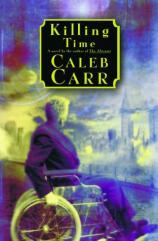Killing Time
Review
Killing Time
Caleb Carr is best known in the popular mind as the author of the historical thrillers THE ALIENIST and THE ANGEL OF DARKNESS, both of which were set in New York near the beginning of the 20th Century. Accordingly, it is a bit of a surprise to find that KILLING TIME, his latest novel, occurs in the near future. 2023 to be exact. A time when information is not always the same as knowledge --- a time, in fact, very much like our own.
The world of KILLING TIME finds the Internet to be the main source of information. People everywhere, at the click of a button, have access to news, rumors, and allegations at any time of day, from anywhere. Dr. Gideon Wolfe, a renowned psychiatrist and historian, becomes involved when he discovers that the visual record of the assassination of President Emily Forester in 2018 was digitally altered. The dissemination of the altered --- and false --- record has caused political upheaval, with a domino effect that in turn has resulted in repercussions throughout the world.
When Wolfe begins to investigate the hoax, he discovers a secret group of scientific and military experts who are on a mission to demonstrate to the world the degree to which the public can be deceived and manipulated. Initially, Wolfe eagerly joins the group in their cause. He soon begins to have second thoughts, however; are the motives of the group as pure as they seem to be? Or do they, themselves, seek to manipulate the populace to their own ends?
KILLING TIME is interesting, though the questions it raises have existed since at least the creation of the Gutenberg printing press, if not before. Newspapers have always been used to inform and to deceive, not only with respect to what they print but also with respect to what they fail to report. Newspapers in New Orleans in the 19th Century, for example, hailed the Crescent City as "The Healthiest City in the Country," while its citizens were dying of cholera and yellow fever by the hundreds.
The same is true of today's electronic media, to an even greater degree. One of the reasons for the rise in popularity and respectability of certain mainstream outlets and Internet journalists is the growing realization that not everything is being reported, and what is being reported is not being reported accurately. This is highlighted by the fact that some 90 percent of what comes straight off the news wire services is often ignored --- or at least would be, if not reported by Matt Drudge and others. What makes Carr's choice of covert villain even more interesting is that this work was originally commissioned by, and serially published in, Time Magazine. That's Time as in Time-Warner/CNN. The products of this conglomerate are everywhere: in our homes, on the newsstands, in the classrooms, and in airports. Do you think that they're reporting accurately? Think again.
Notwithstanding Carr's selection of villain, however, KILLING TIME is a worthwhile read. His style is faintly reminiscent of H. G. Wells or Jules Verne, which, given the political tone and the ultimate socialist slant of the work, is quite appropriate. What is most important here, however, is that, as with all literature that aspires to greatness, KILLING TIME gets the reader thinking. And this, despite whatever other shortcomings it may have, is its ultimate worth.
Reviewed by Joe Hartlaub on November 7, 2000
Killing Time
- Publication Date: November 7, 2000
- Genres: Fiction
- Hardcover: 288 pages
- Publisher: Random House
- ISBN-10: 0679463321
- ISBN-13: 9780679463320




